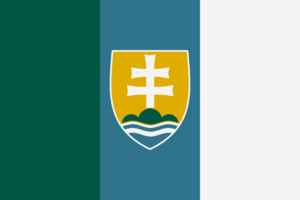Hollenberg

Danouvia-Scneimunt, officially known as the Duchy of Danouvia-Scneimunt, is a Revolutionist state located in the far south of the continent of Cinder. The capital is Scneimunt city in the north-east of the country below the highest peak on the continent of Cinder, Scneimunt mountain. It is bordered by the Commonwealth of Sanéa to the north-east, Firgards to the north, The Holy Pyrannic Empire to the east and Kurutuk to the south, taking it's colonies into account it also borders Sprúsia.
Danouvia-Scneimunt first emerged as a state after being granted independence as the County of Scneimunt during the fall of the Grand Duchy of Danouvia, later on it was raised to a Grand Duchy itself and proclaimed to be Danouvia-Scneimunt, to the anger of Messenia and Dirynum. During March of 2024 the country experienced a revolution, which succeeded in creating a revolutionary government and toppling the Grand Duke. Later on Danouvia-Scneimunt became a member of the revintern in which it still is to this day.
Etymology
The name Danouvia-Scneimunt comes from the lands of Danouvia and Scneimunt, the former part has caused some contreversy among the residents of the Commonwealth of Sanéa as the area of Danouvia proper is not in the revolutionary state of Danouvia-Scneimunt. Despite this, the name was chosen as the then head of house Kazymir allowed Count Stefan Sagadyn to elevate himself to Grand duke and also because the area was settled by residents of the former Grand Duchy of Danouvia and because the County of Scneimunt itself was a vassal of the Grand Duchy.
The name Scneimunt is taken from the region of Scneimunt, which recieves it's name from the mountain of Scneimunt, which is the highest peak on continental Cinder and was for a while the highest known peak in the world. It was first written down as Scnémut translating roughly to Snowy peak in the Pannun language. Later on it was changed to Scnémunt and then finally to Scneimunt.
History
Settlement
The first documented settlers of the region came in November of 2023 from Danouvia. These settlers were mountaineers, among them being Stefan Sagadyn, the later Grand Duke of Danouvia-Scneimunt. After falling in love with the natural beauty of the area, Stefan Sagadyn almost immediately proclaimed it a part of the Grand Duchy of Danouvia, which caused some tensions between Stefan Sagadyn and the Danouvian government, specifically Frankos Kazymir. After long talks it was decided that the newly discovered land would be a vassal of the Grand Duchy of Danouvia, the new land was henceforth known as the County of Scneimunt. The area first settled was on the western side of Scneimunt mountain, the original cottages remain standing to this day.
Fall of Danouvia and statehood
On January 4th 2024, the dissolution of the Grand Duchy of Danouvia was announced, this came as a shock to the Scneimuntinian population, who are known as fierce patriots. One of the last orders of the old Danouvian state was to set free the County of Scneimunt, who's first and only count was Stefan Sagadyn. During this period the construction of Scneimunt city began with the northern facade of the Egjenist church, it is considered one of the greatest architectural monuements in Danouvia-Scneimunt. Even though Stefan Sagadyn was granted independence, he was dissatisfied with the dissolution of Danouvia, and yearned for a new Danouvian state. After recieveing permission from the head of house Kazymir, Stefan Sagadyn proclaimed himself Grand Duke Stefan I. of Danouvia-Scneimunt. The news was met with backlash from the states of Messenia and Dyrinum, as the core Danouvian territories lay on their land.
Revolution and fall of the monarchy
On March 10th 2024, a revolution broke out in the town of Smilets By in the west of the country. The initial revolt was quickly suppressed, but it inspired further revolutionary activity across the nation. Soon the Ducal army could not control the situation and the revolutionaries siezed the capital. After an intense struggle, the revolutionaries even managed to break into Duke's castle, where they promptly defenstrated him.
Colonialisation and expansion
Following the collapse of neighboring Beira at the hands of a plague, its leader decided to give its lands to Scneimunt, increasing its landmass.
Counter-revolution and restoration of the monarchy
In mid June 2024, the monarchist remnants toppled the revolutionary regime and restored the Duchy of Danouvia-Scneimunt.
Geography
Danouvia-Scneimunt is situated in the southern tip of the continent of Cinder. It is a predominantly mountainous land, with it's highest peak being Scneimunt mountain which reaches all the way up to y: 218. Danouvia-Scneimunt posses only 1 surface body of freshwater, that being the Valewood lake, which is in the far east of the country. Indigenous tree types are spruce, oak, dark oak, birch and jungle.
Settlements:
- Scneimunt City - 1 permanent inhabitant
- Smilets by - 1 permanent inhabitant
- Valewood - 2 permanent inhabitants
- Pičkovškovo - no permanent inhabitants
-
-
Culture
While Danouvia-Scneimunt may not be rich in riches, one thing it is rich in is culture. The nation is famed for it's numerous architectural landmarks, considered some of the highest quality on Cinder. While the Danouvian buildings are high quality, they are also very expensive and time consuming to build and so there has been some contreversy as Danouvian builders did not finish the backs of these buildings. In May of 2024, a breakthrough was made, as it was decided by the Scneimunt city authorities to finish the backs of the buildings in the city.